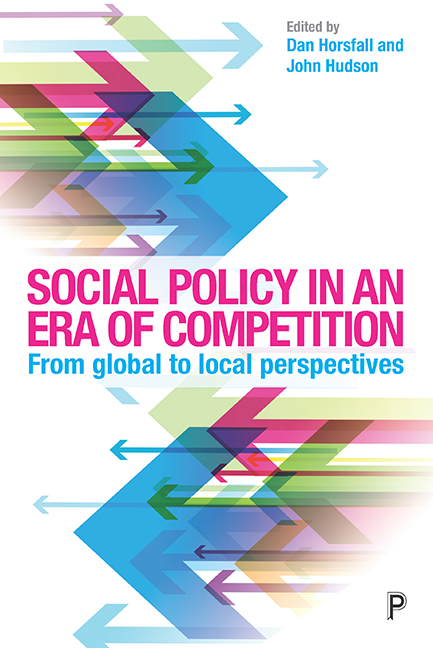Book contents
- Frontmatter
- Contents
- List of figures, tables and boxes
- List of contributors
- List of abbreviations
- Introduction: social policy in an era of competition
- Part One Global competition as the context for welfare
- Part Two The impact of intensifed competition on local governance
- Part Three The reframing of welfare discourses in an era of competition
- Part Four Conclusions
- References
- Index
twelve - Conclusion: social policy in an era of competition
Published online by Cambridge University Press: 05 April 2022
- Frontmatter
- Contents
- List of figures, tables and boxes
- List of contributors
- List of abbreviations
- Introduction: social policy in an era of competition
- Part One Global competition as the context for welfare
- Part Two The impact of intensifed competition on local governance
- Part Three The reframing of welfare discourses in an era of competition
- Part Four Conclusions
- References
- Index
Summary
Transcending the competition state/welfare state dichotomy
As we noted at the outset of the book, Cerny’s (1990) much-cited competition state thesis – and, specifically, his suggestion (with Evans: see Cerny and Evans, 1999; 2004) that the intensification of global economic competition would sound the death knell of the welfare state – provided the immediate impetus for our text. That was directly so for us as editors of the text, for we have worked for some time on exploring the veracity of their argument. Some of our colleagues included in this collection have been less concerned with directly examining the competition state thesis but have instead been engaged in detailed empirical examination of key processes or trends that Cerny and Evans placed at the core of their thesis.
In bringing together these theoretical and empirical research agendas our aim has been, firstly, to address major theoretical debates in the social sciences about how the intensification of global competition has influenced the direction of welfare state reform processes across the OECD in recent decades and, secondly, to offer empirically rooted alternatives to the ‘competition state thesis’ that can better account for how welfare states have responded to competition imperatives in reality. In this chapter we synthesise key arguments from across the book in order to set out an integrated agenda for future research and to underline the value added to these debates when they are approached from a perspective that fuses the applied empirical concerns of traditional social policy scholarship with the broader theoretical perspectives found in comparative political economy and macro-sociology.
As we noted in Chapter One, with the benefit of hindsight we can say that Cerny and Evans over-estimated the threat to the welfare state, but few dispute their central argument that welfare states across the OECD have been subjected to reform agendas that have stressed economic competitiveness. Our task here, therefore, is neither to praise nor to bury the competition state thesis, but instead to articulate a new research agenda addressing the implications of intensified global economic competition for social policy that transcends the welfare state and competition state dichotomy.
- Type
- Chapter
- Information
- Social Policy in an Era of CompetitionFrom Global to Local Perspectives, pp. 203 - 212Publisher: Bristol University PressPrint publication year: 2017

